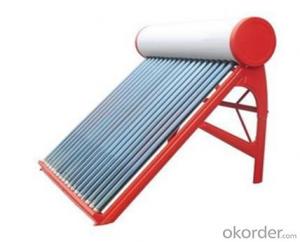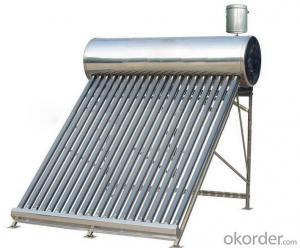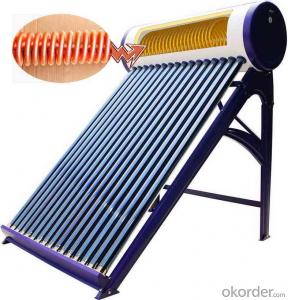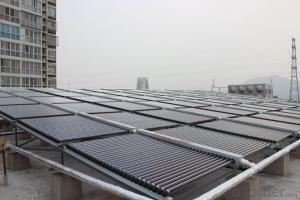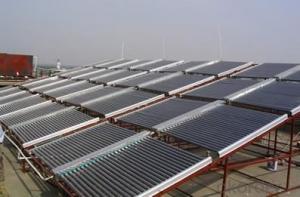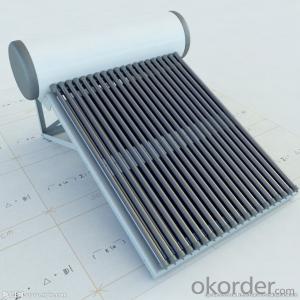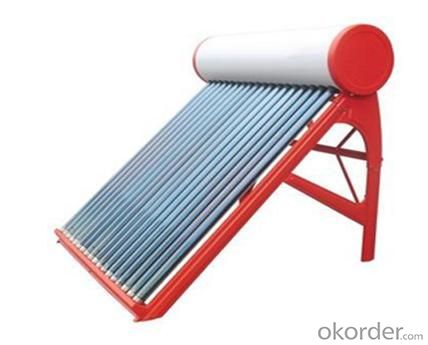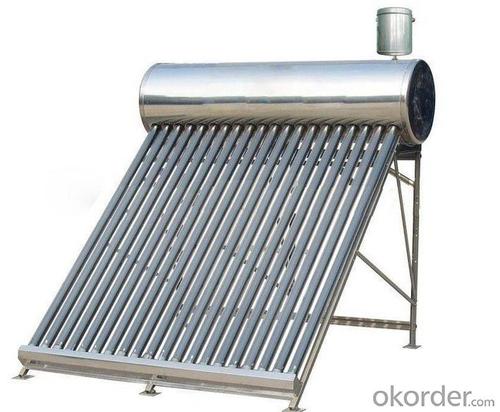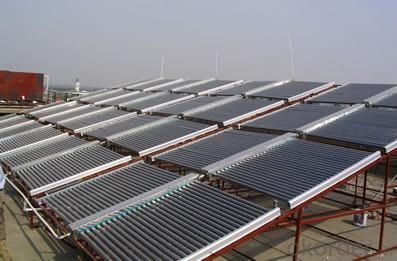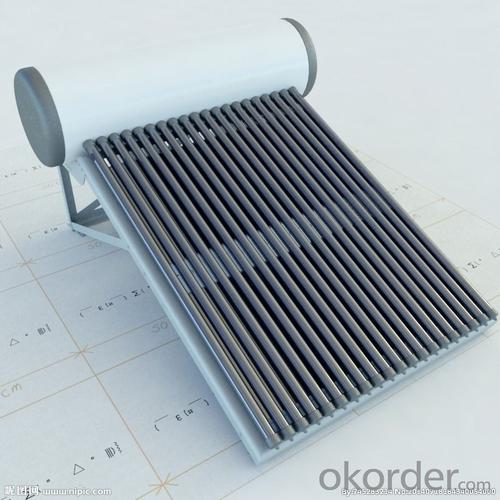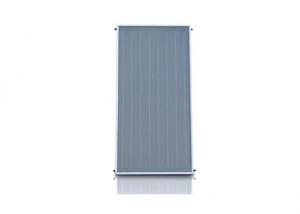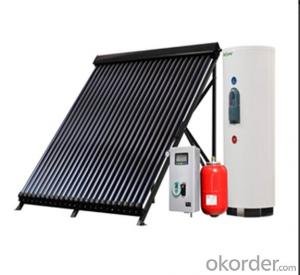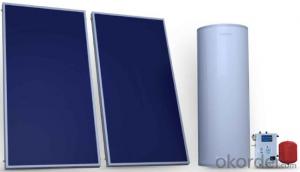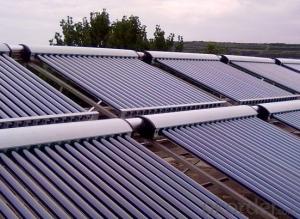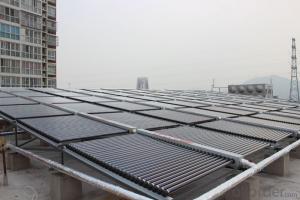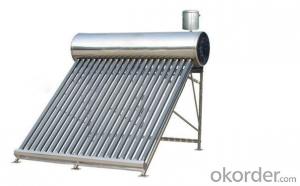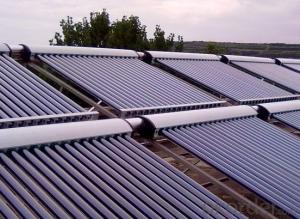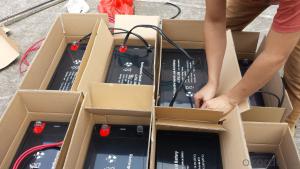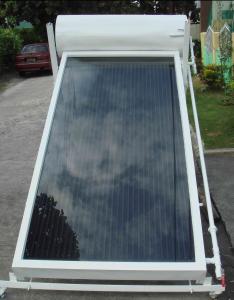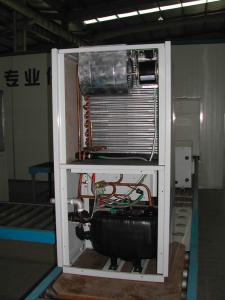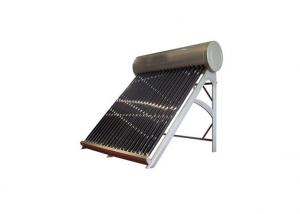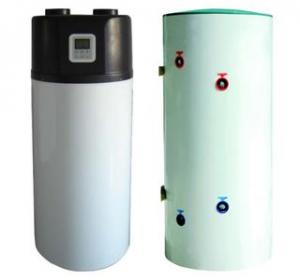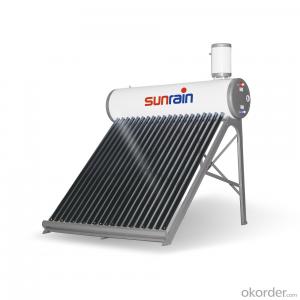Solar Water Heater Panels for Sale - 100L-150L Solar Hot Water System China Famous Brand
- Loading Port:
- China main port
- Payment Terms:
- TT OR LC
- Min Order Qty:
- 10 set
- Supply Capability:
- 10000 set/month
OKorder Service Pledge
OKorder Financial Service
You Might Also Like
Solar water heaters features
1. The upright tank can make the water temperature to a high level. It can hot the water instantly
2. The tank inside the building, the hot water loses less energy than the normal one
3. The solar collector and the tank of solar water heater is separated, that makes the system combine with the building perfectly, which will reduce the sightseeing for the building and environment around
4. Back up with electric heater so that in the day without sunshine hot water can also be used
5. Can be combined with gas or electric heater
6. Max. Pressure: 12bar; Operating Pressure: 6 bar
7. It can be used for other function, such as warming
Solar water heaters working principle
1. The solar collector absorbs solar energy and transmits it to the solar water heater tank through circulation
2. When the temperature of the collector reaches the set value, the controller starts the circulation pump automatically
3. The circulation pump makes heat-conducting liquid circulate automatically
4. The heat-conducting liquid transfers heat to water by lower heat exchanger in the water tank.
5. When the temperature difference between solar collector and heat pipe solar water heaters tank doesn't reach the set value, the circulation pump will be shut automatically
6. In case the temperature of the water tank does not reach Tmax, Electric Heating Element will start to work automatically
Solar water heaters working station component:
1. Operating screen
2. Manometer
3. Pump speed adjust switches
4. Temperature difference circulation pump
5. Flow rate indicator
6. Return circuit connector
7. Safety valve
8. Expansion vessel connector9. Return circuit connector
10. Wall mounting
11. Expansion vessel:8L
12. Pressure resistance: 10 bar pressure for expansion vessel
Solar water heaters specification:
Description | solar water heaters |
Material of out manifold | 0.55mm thickness color steel/ fluorine carbon steel |
Material of inner tank | Food grade 2.0 mm thickness SUS304 stainless steel |
Tank insulating layer | 40mm 45kg/m³ high-density polyurethane foamed |
Inlet and outlet hole | Male G1'' |
Max pressure | 0.6 Mpa |
Solar collector tube | 3.3 Borosilicate glass with N/Al coating |
Thickness of glass tube | 1.6mm |
Vacuum tube tightness | P≤0.005 Pa |
Absorption | as=0.93-0.96 (AM1.5) |
Emission ratio | εh=0.04-0.06 (80C±5C) |
Idle sunning property parameters | Y=220~260m2.C/KW |
Average heat loss coefficient | ULT=0.6~0.7W/(m2.C) |
Bracket: | 2.0mm thickness aluminum alloy |
Tank weight | 75KGS |
Tank size | 560mm Dia x 1810mm Height |
Tank capacity | 300L |
Solar collector | 2pcs 58x1800x15tube solar collector |
Absorber area | 2.811 m² |
Working station | SP116 working station |
Heat exchanger length | Upper:12m, Underside:18m |
Solar water heaters details show:
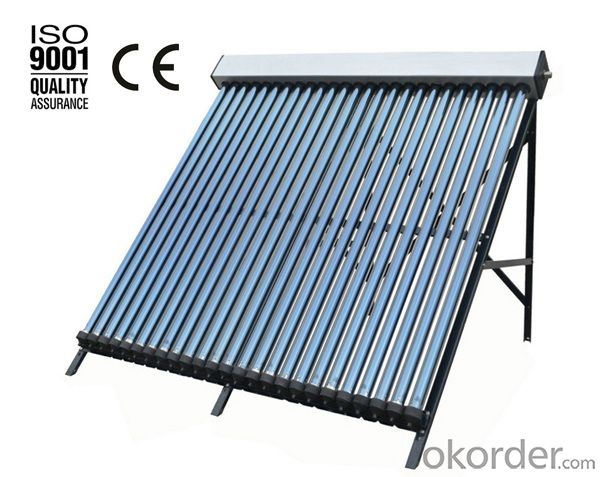
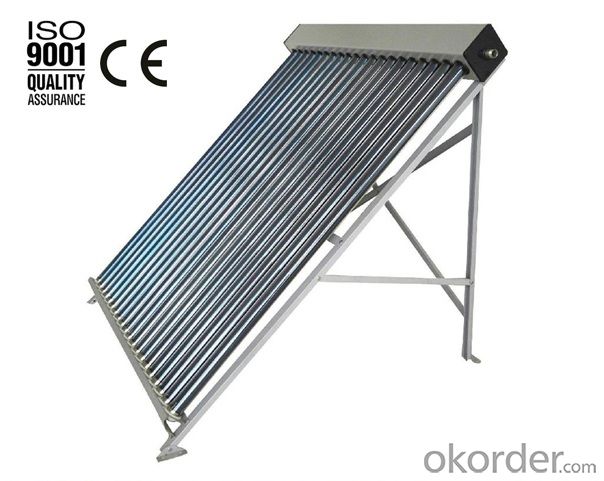
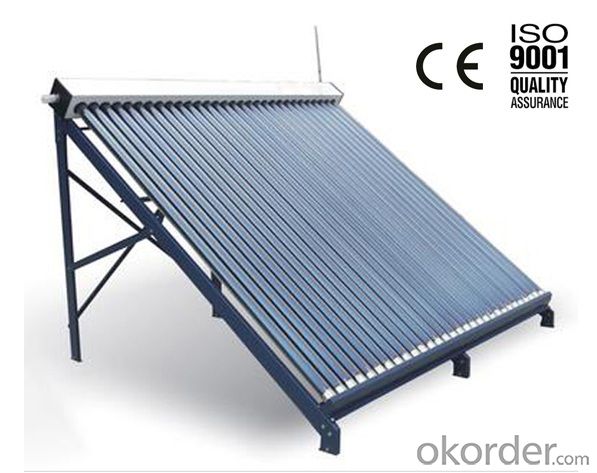
Benefits of this kind of solar water heaters:
1. Prolong the life of your existing water heater
2.Costs less than an electric, gas or oil water heater
3.No maintenance required
4.Lasts longer than a traditional hot water heater
5.Reduce your water heating costs
- Q: Can a solar water heater be used in areas with limited access to water?
- No, a solar water heater cannot be used effectively in areas with limited access to water as it requires a constant supply of water to function properly.
- Q: Buy solar water heater enough to wash five people how much money
- Rainy weather heating and hot water utilization rate is fast, but also greatly reduced after-sales service, both time and energy saving. This type of solar energy than ordinary single warehouse in the absence of the sun heating time is only 20-30 minutes, and a single warehouse needs 2-3 hours!
- Q: What is the lifespan of the solar collector in a solar water heater?
- The lifespan of a solar collector in a solar water heater can vary depending on several factors, including the quality of the collector, the manufacturing process, and the maintenance practices. Generally, a well-built and properly maintained solar collector can have a lifespan of 20 to 30 years or more. High-quality collectors made with durable materials such as copper or stainless steel tend to have longer lifespans compared to lower-cost options made with less durable materials. Additionally, the manufacturing process and design of the collector can affect its durability and longevity. Regular maintenance and inspections are crucial for ensuring the longevity of the solar collector. This includes cleaning the collector's surface to remove any dirt or debris that may reduce its efficiency, checking for leaks or damage, and replacing any worn-out or faulty components. It's also important to note that the lifespan of the solar collector does not necessarily determine the lifespan of the entire solar water heating system. Other components such as the storage tank, circulation pump, and control systems may have different lifespans and may require replacement or maintenance at different intervals. In conclusion, a well-built and properly maintained solar collector can last for 20 to 30 years or more. However, it's essential to consider the quality of the collector, the manufacturing process, and regular maintenance practices to maximize its lifespan.
- Q: Are there any warranties available for solar water heaters?
- Solar water heaters do have warranties that are readily available. Various manufacturers provide warranties for their products, usually safeguarding against any faults in materials or craftsmanship. The duration and conditions of these warranties differ, contingent upon the manufacturer and the particular model of the solar water heater. It is crucial to thoroughly read and comprehend the terms and conditions of the warranty before buying a solar water heater. Moreover, certain manufacturers might present extended warranties or the choice to acquire supplementary warranty coverage for an extra charge.
- Q: In Beijing the top two people concern is how to use the good stability of solar energy is the first to put some cold water you have installed the security of electric electricity to account if all brands of products if the security is not guaranteed the comparison which is more suitable for ah
- Each has its own advantages! The landlord said solar stability is not so good, waste electricity electric water heater, and is not safe, these problems should now rarely appeared in it, the water heater to ingratiate oneself brand, will not do it, now the solar water heater technology has been very good, the electric water heater now is very safe, especially is the brand very power, but the landlord was two people with no electricity. Landlord you do not worry, see whether they like solar energy or electric water heater. If you want to buy solar water heater, you can consider to buy Chinese brand above Emperor Ming, sang Le, temple, Hua Yang, ECOO and so on some brand list, if you want to buy electric water heater, you can consider using the Hubble Harbaugh, my house is the landlord can also consider.
- Q: Can a solar water heater be used in areas with limited access to water infrastructure?
- Yes, a solar water heater can be used in areas with limited access to water infrastructure. Solar water heaters utilize the sun's energy to heat water, so they do not require a connection to a traditional water supply system. As long as there is access to sunlight, solar water heaters can be an effective and sustainable solution for providing hot water in areas without extensive water infrastructure.
- Q: Are there any specific requirements for installing a solar water heater in a historic building?
- Yes, installing a solar water heater in a historic building may require specific requirements or considerations. These can vary depending on the building's historical significance, preservation regulations, and the specific solar water heater system being installed. It is advisable to consult with local authorities, historic preservation organizations, and professionals experienced in both solar water heater installations and historic building preservation to ensure compliance with any specific requirements.
- Q: What is the average cost of a solar water heater?
- The average cost of a solar water heater can vary depending on several factors such as the size, type, and efficiency of the system, as well as the installation and maintenance costs. On average, however, a solar water heater can range from $2,000 to $7,000. This price includes the initial investment for the equipment, including the solar panels, storage tank, and plumbing components, as well as the installation and labor costs. Additionally, there may be additional expenses for permits, inspections, and any necessary upgrades to the existing plumbing system. It is important to note that while the upfront cost may seem higher compared to traditional water heaters, the long-term energy savings and environmental benefits of using solar energy can offset this initial investment over time.
- Q: Can a solar water heater be used in areas with limited access to electricity?
- Yes, a solar water heater can be used in areas with limited access to electricity. Solar water heaters rely on sunlight to heat water, so they do not require electricity to function. This makes them a viable option for areas where electricity is scarce or unreliable.
- Q: Can a solar water heater be installed in a mobile home?
- Yes, a solar water heater can be installed in a mobile home. Solar water heaters are versatile and can be installed on the roof or in the yard of a mobile home. They use energy from the sun to heat water, making them an eco-friendly and cost-effective option for mobile home owners.
Send your message to us
Solar Water Heater Panels for Sale - 100L-150L Solar Hot Water System China Famous Brand
- Loading Port:
- China main port
- Payment Terms:
- TT OR LC
- Min Order Qty:
- 10 set
- Supply Capability:
- 10000 set/month
OKorder Service Pledge
OKorder Financial Service
Similar products
Hot products
Hot Searches
Related keywords
